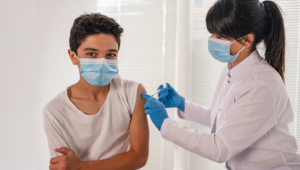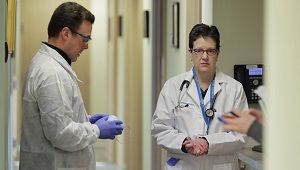Lisa A. Jackson, MD, MPH
Biography
Lisa A. Jackson, MD, MPH, is an internist and infectious disease epidemiologist who has conducted clinical and epidemiologic studies of vaccine safety and efficacy since 1991.
Dr. Jackson is the principal investigator (PI) of KPWHRI’s Vaccine and Treatment Evaluation Unit — one of 10 network sites that the National Institutes of Health (NIH) sponsors. In this role, she leads the phase 1 clinical trial of the COVID-19 vaccine co-developed by Moderna and NIH. Launched in March 2020, this trial was the first in the world to begin testing a COVID-19 vaccine. She is also leading the phase 3 clinical trials of the COVID-19 vaccines developed by Moderna and NIH and by Janssen Pharmaceutical Companies, part of Johnson & Johnson, at KPWHRI.
Additionally, Dr. Jackson serves as KPWHRI’s principal investigator in the Vaccine Safety Datalink Project (VSDP). Sponsored by the Centers for Disease Control and Prevention (CDC), VSDP conducts ongoing research on the safety of licensed vaccines in routine use.
Dr. Jackson has written more than 200 peer-reviewed publications and 14 book chapters. She is a past member of the Food and Drug Administration’s Vaccines and Related Biological Products Advisory Committee and the National Vaccine Program Office’s National Vaccine Advisory Committee.
After receiving her medical degree from the University of Virginia School of Medicine, in Charlottesville, Dr. Jackson earned her Master of Public Health (MPH) degree at the University of Washington (UW) School of Public Health. She completed her internal medicine residency training at the UW School of Medicine and served as an epidemic intelligence officer and preventive medicine resident at the CDC.
Research interests and experience
Vaccines & Infectious Diseases
Vaccine safety; COVID-19 vaccine safety and effectiveness; influenza vaccine effectiveness in the elderly; methodologic issues in vaccine effectiveness evaluations; pneumococcal polysaccharide vaccine effectiveness; pneumococcal conjugate vaccine immunogenicity in the elderly; epidemiology of E. coli bacteremia; epidemiology of community-acquired pneumonia
Recent publications
Belshe RB, Frey SE, Graham IL, Anderson EL, Jackson LA, Spearman P, Edupuganti S, Mulligan MJ, Rouphael N, Winokur P, Dolor RJ, Woods CW, Walter EB, Chen WH, Turley C, Edwards KM, Creech CB, Hill H, Bellamy AR. Immunogenicity of avian influenza A/Anhui/01/2005(H5N1) vaccine with MF59 adjuvant: a randomized clinical trial. JAMA. 2014;312(14):1420-8. doi: 10.1001/jama.2014.12609. PubMed
Bernstein DI, Jackson L, Patel SM, Sahly HM, Spearman P, Rouphael N, Rudge TL Jr, Hill H, Goll JB. Immunogenicity and safety of four different dosing regimens of anthrax vaccine adsorbed for post-exposure prophylaxis for anthrax in adults. Vaccine. 2014 Sep Vaccine. 2014 Oct 29;32(47):6284-93. doi: 10.1016/j.vaccine.2014.08.076. Epub 2014 Sep 17. PubMed
Havers F, Thaker S, Clippard JR, Jackson M, Mclean H, Monto AM, Zimmerman RK, Jackson L, Petrie JG, Nowalk MP, Moehling KK, Flannery B, Thompson MG, Fry AM. Use of influenza antiviral agents by ambulatory care clinicians during the 2012-13 influenza season. Clin Infect Dis. 2014 Sep 15;59(6):774-82. doi: 10.1093/cid/ciu422. Epub 2014 Jul 16. PubMed
Chen WH, Jackson LA, Edwards KM, Keitel WA, Hill H, Noah DL, Creech CB, Patel SM, Mangal B, Kotloff KL. Safety, reactogenicity, and immunogenicity of inactivated monovalent influenza A/H5N1 virus vaccine administered with or without AS03 adjuvant. Open Forum Infect Dis. (Fall 2014) 1 (3): doi: 10.1093/ofid/ofu091 PubMed
McNeil MM, Gee J, Weintraub ES, Belongia EA, Lee GM, Glanz JM, Nordin JD, Klein NP, Baxter R, Naleway AL, Jackson LA, Omer SB, Jacobsen SJ, DeStefano F. The Vaccine Safety Datalink: successes and challenges monitoring vaccine safety. Vaccine. 2014 Sep 22;32(42):5390-8. doi: 10.1016/j.vaccine.2014.07.073. Epub 2014 Aug 6. PubMed
Munoz FM, Bond NH, Maccato M, Pinell P, Hammill HA, Swamy GK, Walter EB, Jackson LA, Englund JA, Edwards MS, Healy CM, Petrie CR, Ferreira J, Goll JB, Baker CJ. Safety and immunogenicity of tetanus diphtheria and acellular pertussis (Tdap) immunization during pregnancy in mothers and infants: a randomized clinical trial. JAMA. 2014;311(17):1760-9. doi: 10.1001/jama.2014.3633. PubMed
Flannery B, Thaker SN, Clippard J, Monto AS, Ohmit SE, Zimmerman RK, Nowalk MP, Gaglani M, Jackson ML, Jackson LA, Belongia EA, McLean HQ, Berman L, Foust A, Sessions W, Spencer S, Fry AM. Interim estimates of 2013-14 seasonal influenza vaccine effectiveness - United States, February 2014. MMWR Morb Mortal Wkly Rep. 2014;63(7):137-42. PubMed
Osterholm MT, Kelley NS, Belongia EA, Jackson LA, Jackson ML. Reply: Cochrane rearranged. Vaccine. 2015 Jan 1;33(1):12. doi: 10.1016/j.vaccine.2014.01.097. Epub 2014 Feb 13. PubMed
Ohmit SE, Thompson MG, Petrie JG, Thaker SN, Jackson ML, Belongia EA, Zimmerman RK, Gaglani M, Lamerato L, Spencer SM, Jackson L, Meece JK, Nowalk MP, Song J, Zervos M, Cheng PY, Rinaldo CR, Clipper L, Shay DK, Piedra P, Monto AS. Influenza vaccine effectiveness in the 2011-2012 season: protection against each circulating virus and the effect of prior vaccination on estimates. Clin Infect Dis. 2014 Feb;58(3):319-27. doi: 10.1093/cid/cit736. Epub 2013 Nov 13. PubMed
Weintraub ES, Baggs J, Duffy J, Vellozzi C, Belongia EA, Irving S, Klein NP, Glanz JM, Jacobsen SJ, Naleway A, Jackson LA, Destefano F. Risk of intussusception after monovalent rotavirus vaccination. N Engl J Med. 2014 Feb 6;370(6):513-9. doi: 10.1056/NEJMoa1311738. Epub 2014 Jan 14. PubMed
News

Vaccine program recruiting volunteers in Seattle area
KPWHRI’s vaccine registry was the first to enroll participants in a clinical trial of a COVID-19 vaccine.
News

Clinical trial will evaluate mpox vaccine for adolescents
The NIH-sponsored trial will help inform decisions about vaccine approval for 12- to 17-year-olds.
Research

New study confirms safety of shingles vaccine
KPWHRI researchers analyzed data from more than 640,000 vaccine doses to understand risk of severe reactions.
Research

‘Fighting back’ against COVID-19: Remembering a historic trial
Lisa Jackson, MD, MPH, Kaiser Permanente Washington senior investigator, recounts the genesis of a groundbreaking vaccine.



